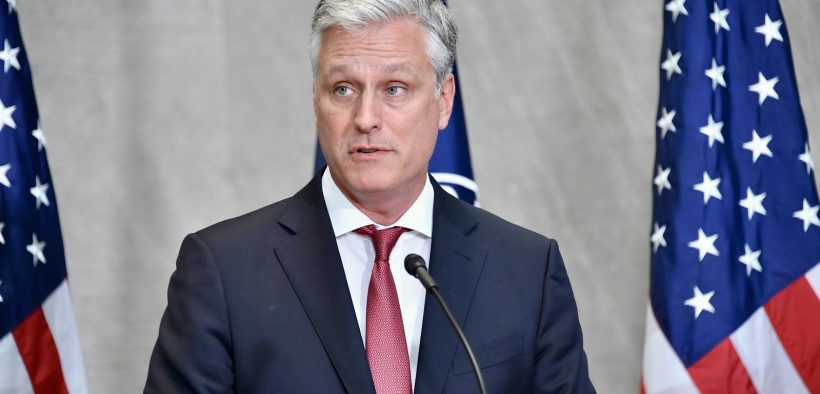Meet Robert O’Brien, Trump’s New National Security Adviser

While some see Robert O’Brien as a step away from John Bolton’s hawkish, pro-war foreign policy, others consider him a traditional “foreign policy elite” sold on U.S. exceptionalism.
U.S. President Donald Trump has chosen hostage negotiator Robert O’Brien as his new security adviser, replacing hawkish John Bolton who was either fired or resigned over clashes with the President regarding foreign affairs.
O’Brien is a lawyer with a long career in foreign policy. Under the George W. Bush administration in 2005, he served as a representative to the U.N. General Assembly where he once worked with Bolton, then the U.S. ambassador to the U.N. O’Brien has also worked with two former secretaries of state, Condoleeza Rice and Hilary Clinton.
“I am pleased to announce that I will name Robert C. O’Brien, currently serving as the very successful Special Presidential Envoy for Hostage Affairs at the State Department, as our new National Security Advisor. I have worked long & hard with Robert. He will do a great job!” tweeted Trump on Wednesday.
The O’Brien appointment comes following drone attacks on Saudi oil facilities on September 14. Houthi rebels in Yemen claimed responsibility for the attack, yet Washington accused Iran of masterminding the raid, though the U.S. has not provided any evidence of Iran’s evolvement.
Reactions to O’Brien’s Appointment
Before his appointment as Trump’s fourth national security adviser, O’Brien rose to prominence when Trump sent O’Brien to help negotiate the release of American rapper A$AP Rocky who was arrested in Stockholm, Sweden on assault charges stemming from a street fight.
Earlier this year, the Los Angeles-based lawyer also played a role in the release of American Danny Burch who was detained in Yemen. Danny Burch was an American citizen working for an oil firm when he was abducted in Yemen in 2017.
NPR national security correspondent Greg Myre described O’Brien as a more docile personality compared to Bolton’s outspokenness.
“So O’Brien is a much lesser-known figure, also has a different type of personality. By reputation, he’s seen as affable, friendly, a manager, a negotiator – not this sort of sharp-elbowed, outspoken figure,” said Myre.
Joel Rubin, a former diplomat who served under former U.S. President Barack Obama, echoed Myre’s statement.
“He is not a high-profile figure, and that’s important,” the deputy assistant secretary of state told Al Jazeera.
Brett McGurk, who has worked for the last three presidential administrations including working as part of the national security team under Bolton, praised O’Brien to NPR as the right man for the vital post.
“Well, for two years in the State Department, he was a colleague of mine. And I worked with him on a few issues. I think, look, he’s a – I think it’s a wise decision. He’s discreet. A little bit about that job as a special presidential envoy and hostage affairs…
“It was created by the Obama administration. And it’s a difficult position. You have to be navigating the inner agency. You’re dealing with the families of hostages. You’re dealing with the foreign governments. And you have to be very discreet. And I think he handled – he handled that job quite well,” McGurk, who quit the Trump administration at the end of last year following Trump’s decision to pull troops from Syria, told NPR.
Is O’Brien the Right Choice?
The appointment of O’Brien raises hopes and questions about what Washington’s foreign policy will look like amid tension with Iran, uncertainty over denuclearization talks with North Korea, and the ongoing trade dispute with China.
The role of national security adviser is crucial; he must be a good negotiator and facilitator. A national security adviser must support the president’s policies, while also knowing how to communicate when the adviser and the president differ over issues.
Some consider O’Brien the right choice as he can provide more of a balancing presence for Trump, as Wayne White, the former deputy director of the Middle East Intelligence Office of the State Department, argued.
“His impact on U.S. foreign policy should be a stabilizing element compared to the garrulous, demanding John Bolton,” White said to Xinhua.
The appointment of O’Brien hints at Trump’s desire to distance himself from Bolton’s hawkish tactics and instead consider negotiations, despite skepticism that he is actually ready to do so. Trump previously expressed his desire to talk to Iran’s President Hassan Rouhani even though Tehran stated there would be no talks with Washington regarding nuclear issues.
However, O’Brien’s presence is believed by some to have little impact on the State Department, given that Pompeo is still likely the most influential foreign policy figure to Trump.
Kevin Zeese, co-coordinator of Popular Resistance, told Sputnik News that Bolton’s exit does not mean that the pro-war period is over, given Pompeo’s hard stance on North Korea.
“Pompeo is a hawk on North Korea as well. He’s not a show horse hawk-like Bolton was; he also is not someone who is going to contradict Trump,” Zeese told Sputnik News.
However, Zeese added that he had no idea what O’Brien’s foreign policy approach will be like as it is too early to tell.
“As I said, it’s too early to judge him. He was in the [George W.] Bush administration, he has some experience, but he’s got minimal experience. And as far as being a strategist on foreign policy, he’s never been at that level, so we don’t know what his thinking is.
“He’s written books, a book that talks about American exceptionalism and how to rebuild America’s role in the world and how we’re the good guys – you know, all the nonsense we hear from the U.S. foreign policy elites – so he seems like he’s a traditional foreign policy elite, on the conservative side, Pompeo’s man,” Zeese added.







